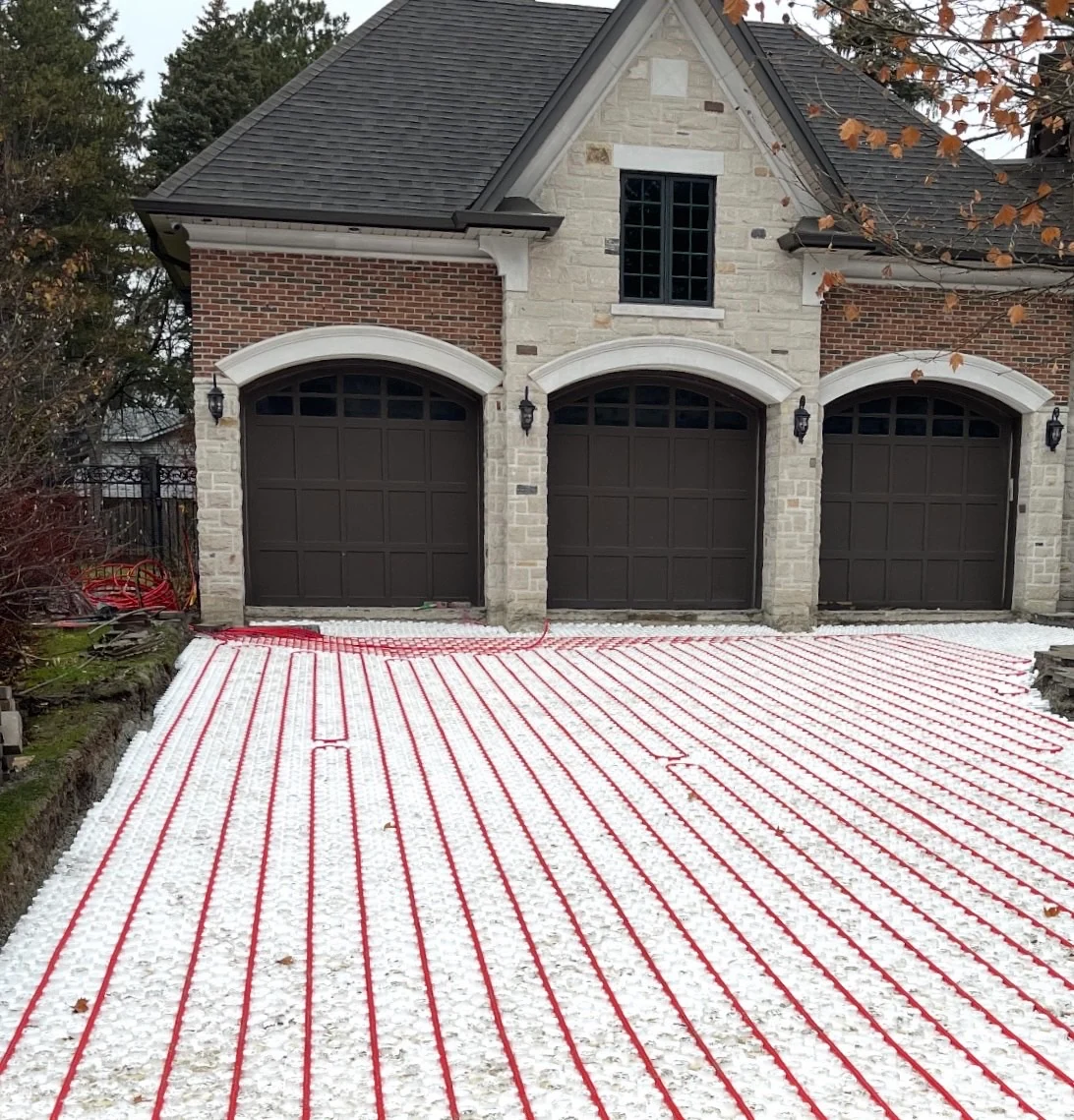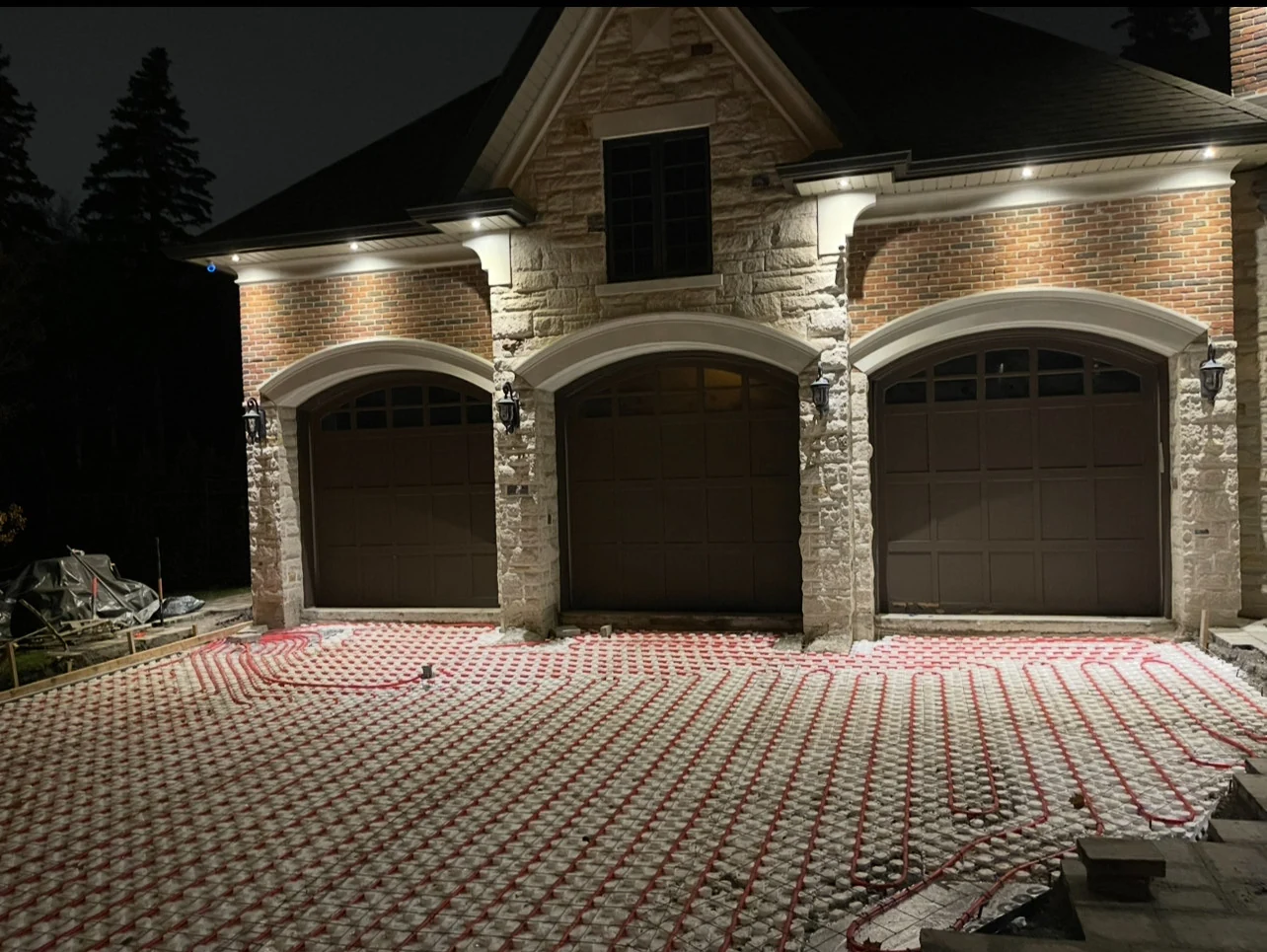In the heart of an Ontario winter, few things are more frustrating than waking up to a snow-covered driveway—especially when you're already running late. Between the early-morning shoveling, icy patches, and salt damage, keeping your driveway clear is a season-long chore.
That's where heated driveways come in.
They offer a permanent, automated way to melt snow and ice—before it even accumulates. But while the promise of a clear, dry driveway is appealing, it naturally raises a big question: Are heated driveways actually worth it?
In this blog, we break down the costs, long-term savings, daily benefits, and whether this investment is right for your home.
What Is a Heated Driveway System?
A Heated Driveway uses an integrated snow-melting system beneath the surface of your interlock, concrete, or stone driveway. When snow or freezing rain begins to fall, sensors activate the system—warming the surface and preventing buildup.
There are two primary systems available, both offered by Precision Landscaping:
Electric Heated Driveways
Electric snow-melt systems use heating cables or mats that run at full power when activated. While installation is simple and the system is 100% efficient at converting electricity to heat, that efficiency doesn't always translate to overall performance.
Because of Ontario's higher hydro costs and limited home electrical capacity, electric systems are generally feasible only for driveways under 600 sq. ft. or for partial heating zones such as tire tracks, garage aprons, or small walkways.
Average installed cost: $28 per sq. ft. of heated surface
Electric systems can also require costly panel upgrades to handle the added load and may need cable replacement after 6–10 years. For most Ontario homes, electric systems are limited to small or secondary areas. Precision primarily recommends glycol-based hydronic systems for long-term performance and energy efficiency.
For detailed operating data, see GTA Heat's Electric vs Hydronic Comparison.
Hydronic Heated Driveways
Hydronic (glycol) heated driveway systems circulate a heated antifreeze mixture through durable ¾″ PEX tubing encased in concrete and insulation. The system is powered by a high-efficiency boiler or heat pump, providing even, consistent heat across the entire surface.
All key components—boiler, pumps, and manifolds—are installed in accessible areas like a garage or mechanical room, making maintenance simple. The tubing typically carries 25-year warranties and can last 50–100 years when properly installed.
Average installed cost: $40 per sq. ft. of heated surface (≈ $22,800 for a 600 sq. ft. two-car driveway) Average operating cost: Around $2.30/hour for a 1,000 sq. ft. area, or roughly $115/month in winter.
Hydronic systems are the preferred option for Ontario homes with natural gas service—they offer lower energy costs, longer lifespan, and more reliable snow melting performance compared to electric systems.
System Selection Guide
| Situation / Goal | Recommended | Why |
|---|---|---|
| Small to mid-size driveway, fast install, lower upfront | Electric | Lower initial cost, quick to install, targeted zones possible |
| Large, curved, or estate-style driveway | Hydronic | Better long-run efficiency, even heat across big areas |
| Budget: heat only high-traffic strips (tire tracks/apron) | Electric | Targeted heating keeps capital low |
| Long laneway in heavy-snow area | Hydronic | Lower operating cost per sq ft, scalable |
| Planning to add heated walkways/steps | Hydronic | Single heat source can serve multiple zones efficiently |
Want to understand the difference in more detail? Read our full Electric vs Hydronic Heated Driveway Comparison.

Installation Costs in Ontario: Full Breakdown
| System Type | Avg. Cost per Sq. Ft. | Total Estimate (500 sq. ft.) |
|---|---|---|
| Electric | $28 | $16,800 |
| Hydronic | $40 | $22,800 |
These averages include demolition (if needed), excavation, insulation, materials, and full professional installation. Electric systems are generally limited to smaller driveways under 600 sq. ft., while hydronic systems are recommended for larger residential applications and whole-surface melting.
For a detailed, real-world comparison of electric vs. hydronic performance in Ontario, see our installer partner's guide: GTA Heat - Electric vs. Hydronic
The difference in upfront pricing is clear—but long-term value depends on how each system performs in real Ontario conditions.
Electric vs. Hydronic Heated Driveways: Real-World Comparison
Operating Costs: How Much to Run a Heated Driveway?
| Feature | Electric System | Hydronic (Glycol) System |
|---|---|---|
| Typical Use | Small areas under 600 sq. ft. | Full driveways, walkways & aprons |
| Installed Cost (per sq. ft.) | $28 | $40 |
| Two-Car Driveway (600 sq. ft.) | ≈ $16,800 | ≈ $22,800 |
| Average Monthly Operating Cost* | ≈ $575 | ≈ $115 |
| Power Source | 200A electrical panel (often upgrade required) | Natural gas boiler or heat pump |
| Component Lifespan | Cables ~ 6–10 yrs | PEX tubing 25+ yrs (50–100 possible) |
| Best Suited For | Tire tracks, aprons, compact zones | Full residential or estate driveways |
*Operating cost figures reflect GTA Heat's Ontario examples/assumptions and are intended as directional comparisons.
Bottom line: In Ontario's climate and rate environment, hydronic systems are the better long-term investment—lower energy use per sq. ft., longer component life, and more reliable performance over large areas.
For more details, see our full blog: How Much Does a Heated Driveway Cost?
Real-Life Benefits of a Heated Driveway
Now that we've covered the numbers, let's get into why so many Ontario homeowners say a heated driveway is one of the best upgrades they've made.
1. Goodbye, Shoveling
No more waking up early to clear snow before work. The system handles everything while you sleep—no more snowblowers, backaches, or emergency salt runs.
2. Safety First
Heated driveways reduce the risk of slips, falls, and vehicle skids. Whether you're helping a child into a car seat or guiding aging parents along the walkway, you'll appreciate the peace of mind.
3. Longer Driveway Lifespan
Snowplows, salt, and freeze-thaw cycles can crack, stain, and shift your driveway. Radiant systems eliminate that damage—protecting your interlock or concrete surface for the long haul.
4. Eco-Friendly Alternative to Salt
De-icers pollute your lawn and nearby water systems. Radiant systems keep surfaces clear without chemicals, making them a cleaner, greener winter solution.
From saving you hours of labour every week to reducing long-term driveway and vehicle wear, heated driveways are more than a winter convenience—they're a year-round investment in comfort and preservation. By eliminating the need for shoveling and minimizing salt-related corrosion, you're not just protecting your body—you're protecting your car, your home's curb appeal, and your free time. It's a smart solution that pays off with every snowfall.

What to Consider Before Installing a Heated Driveway
Heated driveways can be a game-changer for Ontario winters—but they're not one-size-fits-all. Before making the investment, here are a few key factors to consider so you can make the most of your system for years to come.
Retrofitting vs. New Installation
It's much easier—and more cost-effective—to install a heated driveway during a new build or full replacement. Retrofitting an existing surface often requires demolition, excavation, and re-pouring, which adds to the labour and material costs. If your current driveway is already due for replacement, it's the perfect time to consider going radiant.
Electrical Capacity & Power Supply
Electric systems need dedicated circuits and, depending on your home's current panel, possibly an electrical upgrade. Hydronic systems require a reliable heat source like a boiler. Our team can assess your setup to determine whether your property can handle the load or if upgrades are needed.
Driveway Size, Shape & Layout
From long suburban laneways to interlock driveways with tight curves or slopes, your layout matters. Complex designs may require additional zoning and custom system mapping. In some cases, homeowners choose to heat just high-traffic zones or tire tracks to save on energy and materials.
Heated Add-Ons & Upgrades
| Upgrade | Typical Range (CAD) | Purpose |
|---|---|---|
| Heated Walkways (100 sq. ft.) | $2,500–$4,375 | Clear high-traffic paths |
| Heated Garage Apron | $3,000–$5,500 | Entry/exit zones, steep slopes |
| Heated Steps (3–5 risers) | $2,000–$3,000 | Safety for entryways |
| Smart Control Systems | $500–$1,500 | Energy savings, automation |
| Electrical Panel Upgrade | $1,200–$3,500 | Required for many electric systems |
| Snow Sensor Upgrades | $300–$900 | More efficient system activation |
Automation & Controls
Most systems come with snow sensors or timers, but some setups are fully manual. While automation is more convenient, it may come at a slightly higher upfront cost. Think about your daily routine, travel schedule, and how much control you want over when the system activates.
Installation Timeline & Disruption
A heated driveway system typically takes 1–2 weeks to install, depending on size and scope. That includes excavation, laying the radiant system, re-paving, and electrical work. If you're coordinating other outdoor upgrades—like a new garage, patio, or landscaping—it's best to bundle them to reduce downtime.
Long-Term Repairs & Warranties
Quality installation minimizes long-term issues, but like any system, components can wear out. Electric mats, sensors, or hydronic pipes beneath the surface aren't easy to access once buried. That's why Precision uses premium products and offers warranties to protect your investment.
Maintenance & Upkeep Snapshot
| Task | Electric | Hydronic |
|---|---|---|
| Sensor/controls check (annual) | ✅ | ✅ |
| Glycol level check (annual) | — | ✅ |
| Visual surface check after winter | ✅ | ✅ |
| Typical annual cost | Minimal | Minimal–Low |

But Is It Really Worth It?
Let's get honest.
A heated driveway isn't the most inexpensive feature to add to your home. But the value isn't just in cost savings—it's in quality of life.
Here's how to know it's worth it for you:
- You're already planning to replace your driveway
- You pay for snow clearing or spend time shoveling weekly
- You want to increase home value and curb appeal
- You're concerned about winter safety for kids, guests, or elderly family
- You live in a heavy snow zone like Toronto, the GTA, or Muskoka
Many of our clients combine driveway heating with heated walkways, entrances, or garage aprons to create a seamless, all-weather exterior. You can even expand it later.
FAQs: What Homeowners Ask Us Most
Considering a heated driveway but still on the fence? Here are the most common questions we get at Precision Landscaping:
-
Yes. Most systems feature smart sensors for automated use, but you can also install timers or smartphone-connected systems for full control.
-
Possibly. If you choose an electric system, you may need a dedicated breaker or panel upgrade depending on your home's capacity. We handle this during planning. This is one of the key reasons many Ontario homeowners choose hydronic glycol systems instead—they don't draw from your home's electrical capacity and offer superior scalability.
-
While retrofits are possible, it's far more cost-effective to install the system during a new build or major renovation. Retrofitting requires demolition and more labour.
-
Always. We include a layer of sub-surface insulation beneath the system to improve energy efficiency and reduce heat loss.
-
Very little. We recommend:
- Annual system checks
- Monitoring glycol levels (hydronic)
- Sensor testing
Most systems run trouble-free for decades.
Final Verdict: Are Heated Driveways Worth It in Ontario?
Yes—if you value comfort, safety, and long-term durability, heated driveways are absolutely worth it.
They're not just a feature. They're a lifestyle upgrade. One that replaces stress with peace of mind, saves time every week, and protects your property through every winter storm.
And when installed during a new driveway project, they're easier and more affordable than many homeowners expect.
Ready to Upgrade Your Winter Routine?
At Precision Landscaping, we design and install custom Heated Driveway Systems that match your home, your goals, and your lifestyle. Whether you want to heat your full driveway, tire tracks, or just the garage apron—we make winter easier, safer, and stress-free.
Contact us today to book your free consultation. Let's build something that works all year long—especially when the snow hits.
